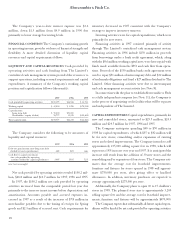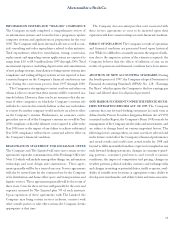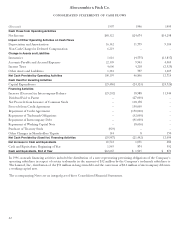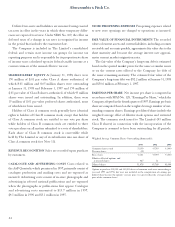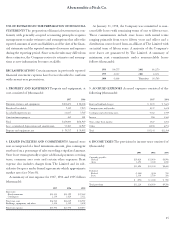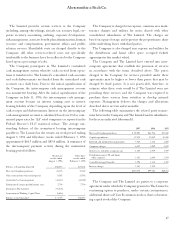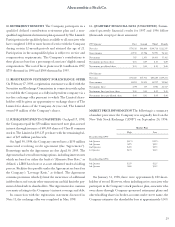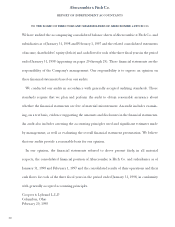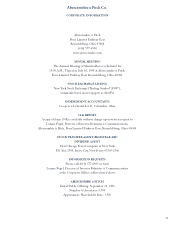Abercrombie & Fitch 1997 Annual Report Download - page 20
Download and view the complete annual report
Please find page 20 of the 1997 Abercrombie & Fitch annual report below. You can navigate through the pages in the report by either clicking on the pages listed below, or by using the keyword search tool below to find specific information within the annual report.
28
Abercrombie &Fitch Co.
The Company has no arrangements with The Limited which
result in the Company’s guarantee, pledge of assets or stock to
provide security for The Limited’s debt obligations.
The Company’s proprietary credit card processing is per-
formed by Alliance Data Systems which is approximately 40%
owned by The Limited.
9. STOCK OPTIONS AND RESTRICTED STOCK Under the
Company’s stock plan, associates may be granted up to a total of
3.5 million restricted shares and options to purchase the
Company’s common stock at the market price on the date of
grant. In 1997, associates of the Company were granted approx-
imately 1.7 million options, most of which are expected to vest
on a graduated basis over six years, subject to certain performance
goals. The remaining options generally vest 25% per year over the
first four years of the grant. A total of 12,000 shares have been
issued to nonassociate directors, all of which vest over four years.
All options have a maximum term of ten years.
The Company adopted the disclosure requirements of SFAS
No. 123, “Accounting for Stock-Based Compensation,” effective
with the 1996 financial statements, but elected to continue to
measure compensation expense in accordance with APB
Opinion No. 25, “Accounting for Stock Issued to Employees.”
Accordingly, no compensation expense for stock options has been
recognized. If compensation expense had been determined
based on the estimated fair value of options granted in 1997 and
1996, consistent with the methodology in SFAS No. 123, the
effect on net income and earnings per diluted share would
have been a reduction of approximately $1.7 million, or $.03 per
share in 1997. In 1996, the pro forma effect would have no
impact on net income and earnings per diluted share. The
weighted average fair value of options granted during fiscal
1997 and 1996 was $8.50 and $6.67. The fair value of each
option was estimated using the Black-Scholes option-pricing
model with the following weighted average assumptions for
1997 and 1996: no expected dividends, price volatility of 35%,
risk-free interest rates of 6.0% and 6.25%, assumed forfeiture rate
of 10% and expected lives of 6.5 and 5 years.
The pro forma effect on net income for 1997 and 1996 is not
representative of the pro forma effect on net income in future
years because it takes into consideration pro forma compensa-
tion expense related only to those grants made subsequent to
the Company’s initial public offering.
A summary of option activity for 1997 and 1996 follows:
1997 1996
Weighted Weighted
Average Average
00Shares Option Price Shares Option Price
Outstanding at
beginning of year 240,000 $16.00 – –
Granted 1,669,000 18.03 240,000 $16.00
Exercised (4,000) 16.00 – –
Canceled (21,000) 16.00 – –
Outstanding at
end of year 1,884,000 $17.81 240,000 $16.00
Options exercisable
at year end 35,000 $16.00 –
Approximately 88% of the options outstanding at year end
are at $16 per share. Most of the remaining options outstanding
are at $31 per share.
A total of 547,000 restricted shares were granted in 1997,
with at total market value at grant date of $8.7 million. Of this
total, 500,000 shares were subject to performance require-
ments and a defined vesting schedule over six years. The
remaining restricted stock grants generally vest either on a
graduated scale over four years or 100% at the end of a fixed
vesting period, principally five years. The market value of
restricted stock, subject to adjustment at the measurement date
for shares with performance requirements, is being amortized
as compensation expense over the vesting period, generally
four to six years. Compensation expenses related to restricted
stock awards amounted to $6.2 million, $.5 million and
$.4 million in 1997, 1996 and 1995.


